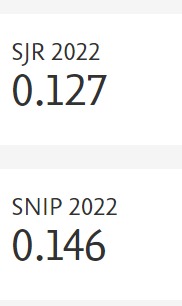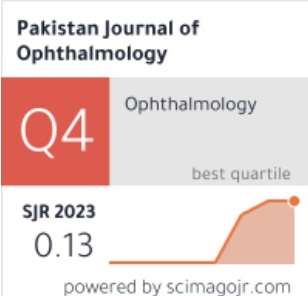Outcome of Amniotic Membrane Transplant in Persistent Corneal Epithelial Defects
Doi: 10.36351/pjo.v38i1.1340
DOI:
https://doi.org/10.36351/pjo.v38i1.1340Abstract
Purpose: To determine the outcome of amniotic membrane transplant in patients with ocular surface disease.
Study Design: Interventional Case series study.
Place and Duration of Study: Layton Rahmatullah Benevolent Trust Eye Hospital, Korangi 2½, Karachi, from January, 2019 to July 2019.
Methods: Patients with an age range of 20 – 45 years, either gender and who had persistent corneal epithelial defects as a consequence of keratitis, chemical injuries, bullous keratopathy and Mooren’s ulcers were included. Informed consent was obtained. Preserved amniotic membrane was used in all patients and they were followed at 1 week, 1, 3 and finally at 6 months and results were evaluated in terms of stable, healed and pain-free cornea.
Results: Mean age of the patients was 37.94 ± 6.78 years. Majority of the patients (60.0%) were less than 40 years of age. Out of 58 patients, 45 (77.6%) were males and 13 (22.4%) were females. Mean duration of injury was 7.67 ± 2.28 weeks with majority of patients i.e. 62% were with less than 8 weeks of duration. Most common cause of persistent corneal epithelial defect was bacterial keratitis (17.2%) followed by vegetative trauma (13.8%). Successful surgical outcome as healed cornea was observed in 53 (91.4%) patients.
Conclusion: Amniotic membrane transplant is an effective treatment for persistent corneal epithelial defects unresponsive to standard medical treatment. This surgical technique is effective in terms of healing and resolving the inflammation and preserving the useful vision.
Key Words: Persistant corneal epithelial defect, Amniotic Membrane, Bullous keratopathy.
Downloads
Published
How to Cite
Issue
Section
License
Copyright (c) 2021 Tiabbah Saleem, Syeda Ayesha Bokhari

This work is licensed under a Creative Commons Attribution-NonCommercial 4.0 International License.






